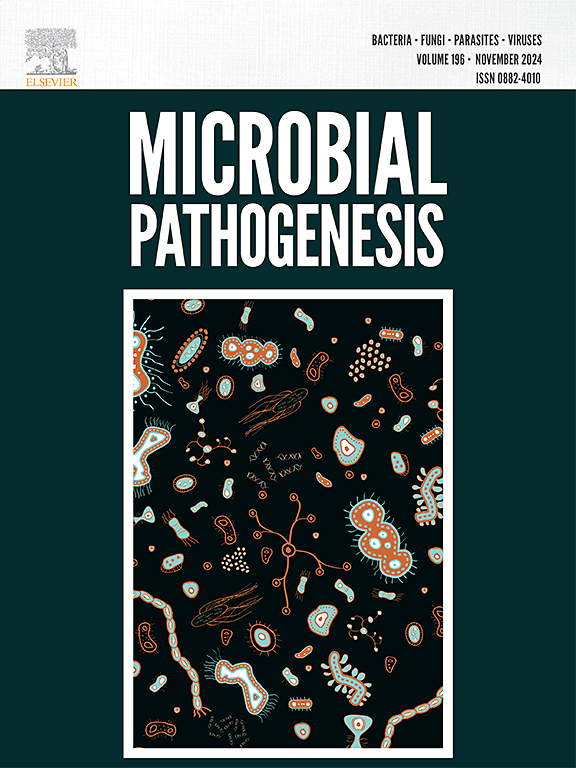针对多重耐药细菌的综合策略:为全球健康合成新的抗菌前沿。
IF 3.5
3区 医学
Q3 IMMUNOLOGY
引用次数: 0
摘要
令人关切的是,耐多药细菌已成为世界范围内的主要问题,它阻碍了传染病的治疗,并使人们对现有药物的治疗偶然性产生怀疑。由于传统抗生素无法跟上细菌进化的步伐,新的抗菌干预措施值得发展。本文讨论了对抗耐多药感染的各种有希望的方法。研究抗菌肽的广谱功效和降低产生耐药性的能力,而噬菌体疗法可能在抗生素失效的极端情况下使用。此外,将探索CRISPR-Cas系统特异性靶向和根除细菌群体中的抗性基因的可能性。纳米技术开辟了改善药物本身递送系统的途径,在保护宿主的同时提高了抗菌作用的有效性和特异性。通过合成生物学的发展和以天然产品为基础的药物的重新发现,发现潜在的抗菌剂是一个令人兴奋的前景。此外,宿主导向疗法现在正成为主要治疗策略的一种辅助手段,而不是专门针对病原体。尽管这些进展令人印象深刻,但关于生产规模、监管批准、安全性和临床应用有效性的问题仍然很突出。因此,应对耐多药耐药性负担需要一项多管齐下的计划,将新的治疗方式与现有的抗生素方案结合起来,实施强有力的管理举措,并在全球层面实施政策变革。如果鼓励跨学科机构之间的合作和持续的研究努力,国际卫生界就能做好准备,应对日益严重的抗生素耐药性威胁。在本研究中,除了总结最近的进展外,我们还评估了各种药物联合使用的协同潜力。为了重新思考未来的抗菌药物管理,我们提供了一种多层模式,结合了以病原体为中心和以宿主为导向的策略。本文章由计算机程序翻译,如有差异,请以英文原文为准。
Integrative strategies against multidrug-resistant bacteria: Synthesizing novel antimicrobial frontiers for global health
Concerningly, multidrug-resistant bacteria have emerged as a prime worldwide trouble, obstructing the treatment of infectious diseases and causing doubts about the therapeutic accidentalness of presently existing drugs. Novel antimicrobial interventions deserve development as conventional antibiotics are incapable of keeping pace with bacteria evolution. Various promising approaches to combat MDR infections are discussed in this review. Antimicrobial peptides are examined for their broad-spectrum efficacy and reduced ability to develop resistance, while phage therapy may be used under extreme situations when antibiotics fail. In addition, the possibility of CRISPR-Cas systems for specifically targeting and eradicating resistance genes from bacterial populations will be explored. Nanotechnology has opened up the route to improve the delivery system of the drug itself, increasing the efficacy and specificity of antimicrobial action while protecting its host. Discovering potential antimicrobial agents is an exciting prospect through developments in synthetic biology and the rediscovery of natural product-based medicines. Moreover, host-directed therapies are now becoming popular as an adjunct to the main strategies of therapeutics without specifically targeting pathogens. Although these developments appear impressive, questions about production scaling, regulatory approvals, safety, and efficacy for clinical employment still loom large. Thus, tackling the MDR burden requires a multi-pronged plan, integrating newer treatment modalities with existing antibiotic regimens, enforcing robust stewardship initiatives, and effecting policy changes at the global level. The international health community can gird itself against the growing menace of antibiotic resistance if collaboration between interdisciplinary bodies and sustained research endeavours is encouraged. In this study, we evaluate the synergistic potential of combining various medicines in addition to summarizing recent advancements. To rethink antimicrobial stewardship in the future, we provide a multi-tiered paradigm that combines pathogen-focused and host-directed strategies.
求助全文
通过发布文献求助,成功后即可免费获取论文全文。
去求助
来源期刊

Microbial pathogenesis
医学-免疫学
CiteScore
7.40
自引率
2.60%
发文量
472
审稿时长
56 days
期刊介绍:
Microbial Pathogenesis publishes original contributions and reviews about the molecular and cellular mechanisms of infectious diseases. It covers microbiology, host-pathogen interaction and immunology related to infectious agents, including bacteria, fungi, viruses and protozoa. It also accepts papers in the field of clinical microbiology, with the exception of case reports.
Research Areas Include:
-Pathogenesis
-Virulence factors
-Host susceptibility or resistance
-Immune mechanisms
-Identification, cloning and sequencing of relevant genes
-Genetic studies
-Viruses, prokaryotic organisms and protozoa
-Microbiota
-Systems biology related to infectious diseases
-Targets for vaccine design (pre-clinical studies)
 求助内容:
求助内容: 应助结果提醒方式:
应助结果提醒方式:


